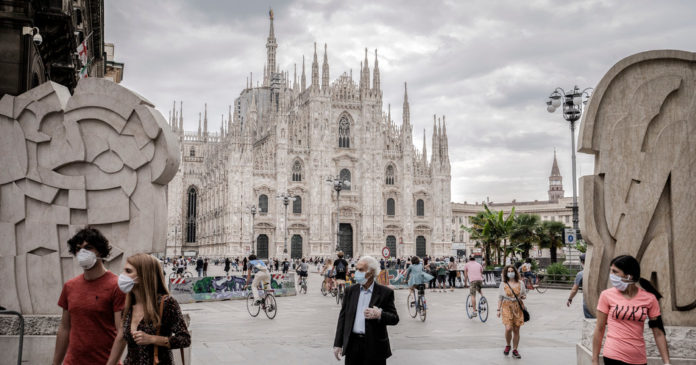(Want to get this briefing by email? Here’s the sign-up.)
Good morning.
We’re covering efforts to lift travel restrictions in Europe in time for summer, a dire warning from the Federal Reserve chair and survivors of the slaughter in an Afghan maternity clinic.
Europe’s goal: Reopening borders in time for tourism
With an eye on summer tourism, the European Commission recommended the reopening of borders that were closed to stop the spread of the coronavirus.
Cross-border vacation travel had been expected to generate 1.3 billion euros, or $1.4 billion, in spending in 2020 before the border lockdowns. In southern member states, income generated by tourism accounts for as much as 20 percent of their economies.
But recommendations from the commission are not binding. And restrictions remain in place for Italy and Spain, the bloc’s hardest-hit members. That leaves European Union countries to create a patchwork of policies.
Interior Minister Horst Seehofer of Germany said that together with Austria, France and Switzerland, his country would begin easing border restrictions on Saturday, with the aim of lifting them entirely by June 15.
The Fed chair warns of potentially dire consequences
Jerome Powell, head of the Federal Reserve, delivered a stark warning that the coronavirus crisis could permanently damage the U.S. economy if Congress and the White House do not provide sufficient financial support to prevent a wave of bankruptcies and prolonged joblessness.
But Congress is divided on another financial aid package, and President Trump and his economic advisers have pressed the pause button on negotiations, waiting to see the impact from states lifting restrictions on business activity.
And armed militia-style protesters have helped businesses across Texas to reopen, defying coronavirus lockdowns. Protesters say they are enforcing the state’s constitution.
White House moves: President Trump pushed to reopen the country’s schools and criticized the nation’s top infectious disease expert, who had cautioned the Senate about the unknown effects that the coronavirus has on children.
If you have 7 minutes, this is worth it
A ‘cafeteria’ for pathogens in Indonesia
“The market is like a cafeteria for animal pathogens,” said the lead expert for Indonesia’s coronavirus task force. “Consuming wild animals is the same as playing with fire.”
Coal: The U.S. is projected to use more renewable energy than coal for electricity this year, a milestone driven by the pandemic. Demand for electricity has fallen sharply and, because coal plants tend to cost more to operate than cleaner alternatives, many utilities are cutting back on coal power first.
Snapshot: Above, survivors in a maternity clinic in Kabul after three militants killed at least 15 people there Tuesday. When the carnage was over, what remained were 18 newborns, many covered in blood and most now motherless, casualties of war in Afghanistan before they had even left the hospital.
U.S. Open: The scheduled August start of the tennis tournament is still three months away, but the United States Tennis Association has begun to seriously explore alternative plans because of the lockdown in New York City. Options could include moving it to Orlando, Fla., or Palm Springs, Calif., but players would still need to travel to the U.S. from all over the world.
Matt Damon: The American actor, who is riding out the virus lockdown in an Irish town that has been fiercely protective of him, finally called in to a Dublin radio station that had lobbied for an interview. Among other topics, Mr. Damon talked about his 2011 pandemic film. “Anybody who says you couldn’t predict this, just look at ‘Contagion,’” he said. “The whole thing is tragic and sad.”
What we’re listening to: Slate’s “Working” podcast. “Listening to Rumaan Alam and Isaac Butler address productivity in creative work is extremely relevant to my interests right now,” writes Taffy Brodesser-Akner, a feature writer on The Times Magazine. “This is my favorite episode so far, with the crime novelist Megan Abbott talking process of writing across platforms and about ‘Michael Clayton,’ one of my favorite screenplays.”
Now, a break from the news
Cook: Melissa Clark’s easy, crunchy baked mac and cheese comes together directly in the pan, without having to boil the macaroni first.
At Home offers many more ideas on what to read, cook, watch and do while staying safe at home.
And now for the Back Story on …
Four quarantines on two continents
Amy Qin, one of our China correspondents, was crowned the Quarantine Queen by her friends after going through quarantines in four cities on both sides of the Pacific Ocean. Each offered a window into the ways that governments were grappling with the virus.
Here are edited excerpts from her Quarantine Dispatch.
Quarantine No. 1: San Diego, after arriving on the last State Department-arranged flight to evacuate Americans from Wuhan, China.
Face masks were not required. And though we were confined to one area of a military base, we were still permitted to mingle. After the frenzied rush to procure masks in China, the lax guidelines struck me as odd.
Quarantine No. 2: Beijing, after returning to China via South Korea.
The local authorities knew about my Seoul layover and wanted to put me in state-supervised quarantine, possibly at a government site, but I completed this round of self-confinement at home. I only left a few times to walk the dog — always with a mask on.
I never heard back from the authorities. To me, it was China’s response to the epidemic in a nutshell: effective, if heavy-handed, and not always fail-safe.
Quarantine No. 3: Los Angeles, after being expelled from China along with a number of other American journalists.
The official guidance on masks was all over the place. Testing was in a shambles. Discrimination against Asian-Americans was on the rise. Though I had my temperature checked at Los Angeles International Airport, someone forgot to collect the form that I had filled out with my local contact information and health status. I didn’t realize it until later.
For days, I holed up in a lovely Airbnb cottage in Venice, Calif.
Quarantine No. 4: Taipei, my new reporting base.
After multiple heath checks at the airport, I went straight to my hotel, where I was met outside by a worker in a protective suit, mask and goggles who disinfected my suitcases. He was the last human being I saw for two weeks.
Every day, I reported my temperature to the hotel and my health status to the Taiwanese government. Three times a day, a hotel employee came by to hang a takeout meal on a plastic hook that had been affixed to the door. After two weeks, I was finally released.
That’s it for this briefing. While you’re online, beware of pandemic scams. See you next time.
— Victoria
Thank you
To Melissa Clark for the recipe, and to Theodore Kim and Jahaan Singh for the rest of the break from the news. You can reach the team at briefing@nytimes.com.
P.S.
• We’re listening to “The Daily.” Our latest episode is about the debate at the Supreme Court over President Trump’s financial records and presidential power.
• Here’s today’s Mini Crossword puzzle, and a clue: Grow narrower at the tip (five letters). You can find all our puzzles here.
• Elizabeth Paton, our London-based reporter on fashion and the luxury industry, was the focus of an interview in Fashionista about how she became a power player in the field.
Source : Nytimes










